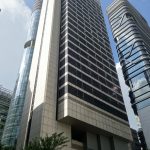Prominently located near Tuas Checkpoint and future Tuas Mega Port, the Tuas industrial properties at 31 Tuas South St 5 and 8 Tuas South St 6 present untapped redevelopment opportunities
Colliers International announced on June 17 that it will put up two industrial properties located at Tuas for sale via an expression of interest exercise (EOI).
The two Tuas industrial properties are namely 31 Tuas South St 5 and at 8 Tuas South St 6 with indicative prices of S$17 million and S$6 million, respectively.
Table of Contents

One of the two Tuas industrial properties is at 31 Tuas South St 5
This property has an indicative price of S$ 17 million translates to S$107 per sq ft (psf) based on the total land area of 158,402 sq ft (14,716sq m).
The property is a General Industrial factory located in the Tuas Planning area of Singapore. It comprises a single two-storey mezzanine factory with ancillary office space and three single-storey factory blocks. The land is zoned Business 2 with a maximum allowable plot ratio of 1.4 under the Master Plan 2019. The property has an existing Gross Floor Area (GFA) of 95,056 sq ft, translating to a plot ratio of 0.6. With a land tenure of 30 years commencing from 2006, the property has a remaining tenure of approximately 16 years.
Mr Steven Tan, Senior Director of Capital Markets & Investment Services at Colliers International, said, “This property presents an investment upside with untapped redevelopment potential. Given that the site has an unutilised GFA quantum, it can be maximised up to a total GFA of 221,762 sq ft under the current Master Plan, subject to approval from the relevant authorities.”
Land premium has been fully paid upfront and this development is suitable for end-users who are looking for a large plot of land for their operations.
The building has excellent connectivity to Tuas Checkpoint and the future Tuas Mega Port, and is highly accessible via major roads and public transport with Tuas South MRT station in the vicinity.

The other one of the Tuas industrial properties is located at 8 Tuas South St 6
The indicative price of S$6 million translates to approximately S$183 psf based on its current total GFA of 32,663 sq ft (3,034.5sq m).
Completed in 2017, the property is a five-storey detached factory building also located in the Tuas Planning area of Singapore. The building is currently vacant, and it comprises a warehouse with ancillary office space, 11 parking lots and a cargo lift. The land is zoned Business 2 with a maximum allowable plot ratio of 1.0.
With a leasehold tenure of 22 years commencing from 1 October 2013, the property has a remainder land tenure of about 13 years. Situated on JTC land, the annual land rent has been waived.
Mr Tan added, “We believe this industrial property is excellent for investors and end-users looking for warehouse space as it has a high ceiling height. As the building is newly completed, buyers need not fork out large sums of capital expenditure to spruce up the building and can move in for operations almost immediately.”
The building is strategically located near the future Tuas Mega Port and has easy access to Malaysia through the nearby Tuas Checkpoint. The property is well-connected by major arterial roads and expressways, including Tuas Flyover and Ayer Rajah Expressway (AYE).
Mr Tan added, “Both properties are likely to benefit from being located near the future Tuas Mega Port, which will commence its first phase of operations with two berths in 2021. We expect demand in the area to increase when Tuas Mega Port commences operations.”
The EOI for both Tuas industrial properties will close at 3pm on Thursday, 16 July 2020.
The sale of the Tuas industrial properties comes amidst research reports suggesting manufacturing and technology sectors are set to thrive post pandemic. Colliers International on May 29 released its Resilience and Rebound Ranking Report, identifying the most attractive industries over the past crises, the implications and opportunities for commercial real estate sectors post-coronavirus pandemic.
In assessing seven core trade sectors in Singapore – manufacturing, financials, construction, professional services, hospitality, retail and technology – Colliers Research considered three factors, GDP growth, stock index returns and earnings outlook.
Ms. Tricia Song, Head of Research for Singapore at Colliers International, said, “We recommend investors to focus on prime offices and industrial buildings, such as hi-spec space and business parks. Hotels and retail malls could also provide near-term opportunities. Occupiers should embrace technology and more flexible work strategies in the longer term.”
Top Resilience and Rebound Ranking of Core Trade Sectors
Colliers’ Research ranks the resilience and rebound potential of core sectors is based on three metrics: historical GDP performance and stock index returns during and post other major crises, as well as future earnings growth.
#1 Manufacturing: Manufacturing ranks top in our overall resilience and rebound ranking, on strongest GDP rebound, as well as second highest stock index returns and earnings outlook.
#2 Technology: Technology ranks second in our resilience and rebound ranking, driven by second highest GDP growth resilience, highest stock index returns and strongest earnings outlook.
#3 Hospitality: Ranking third, Hospitality is among the most volatile sectors, having experienced significant effects during the crisis, with a strong rebound expected to follow. Looking ahead, earnings growth is expected to be strong, giving it a favorable tilt.
Market Implications and Outlook
Industrial sector to benefit from Manufacturing rebound post-COVID-19
While the manufacturing sector is expected to contract in the near-term due to labour shortages amidst more stringent restrictions during COVID-19, our research suggests a strong rebound in the sector as Singapore emerges from the pandemic and Circuit Breaker measures. This bodes well for the industrial sector.
Rick Thomas, Head of Occupier Services for Singapore at Colliers International, said: “The strong rebound of the manufacturing sector expected post pandemic, together with increasing technology adoption, e-Commerce sales, delivery service needs, data broadband usage and other online activities, will directly benefit the sector across business parks, logistics spaces and data centres.”






